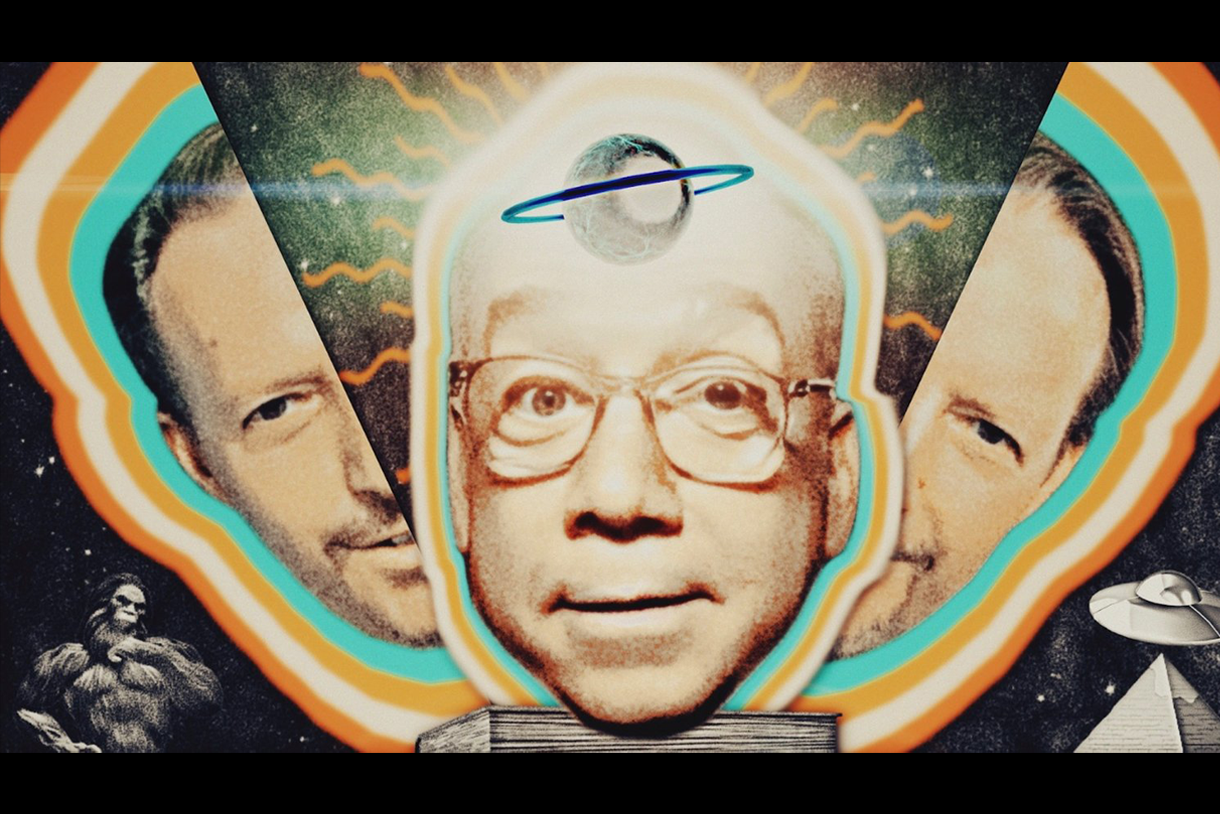Professor Stephen Asma Launches Podcast 'Chinwag' With Actor Paul Giamatti
 Podcast art courtesy of Treefort Media.
Podcast art courtesy of Treefort Media.Get your tin foil hats out, because History, Humanities, and Social Sciences Professor Stephen Asma and friend and actor Paul Giamatti are diving into the world of the esoteric, oddities, and other theories of everything and anything on their new podcast Chinwag.
Chinwag launched on April 5 and features guests from across Hollywood including actors Billy Bob Thornton, Kathryn Hahn, and William Shatner. The pair even recorded an episode live at SXSW with comedian and actor Patton Oswald.
A philosopher and author by trade, Asma brings a unique perspective to what some may consider trivial topics that have captivated people for generations. The pair met when Giamatti emailed Asma after hearing the professor give a talk on the topic of imagination. Asma initially thought the message was a goofy prank by some wily Columbia students, but quickly realized the email was the real deal.
He answered a few questions about the wilderness of the mind, recording at SXSW, and what to expect from him and Giamatti on Chinwag.
Q: How did you and Paul get the inspiration for Chinwag?
A: A “chinwag” is a slang term for a “friendly conversation.” Paul and I started talking online about all kinds of things during the pandemic. He reads voraciously and has a huge personal library. We’d discuss books, science, esoterica, paranormal stuff, monsters, philosophy, and art. Eventually we started recording our conversations, and we asked a former student of mine--the amazing artist and Columbia alum Alex Sokol ‘10--to animate parts of the conversations. We began to see that it would make a fun podcast if we added some guests. Our production team at Treefort and Touchy Feely Films is continuing the animation component by having Alex make short videos to go with every episode. Basically, the podcast emerged organically from our weird conversations over the last three years.
Q: What parts of your academic background influence how you approach or discuss the esoteric and the supernatural?
A: I’m very interested in paranormal phenomena and conspiracies, but as a professor of philosophy I tend toward the skeptical side of the continuum. When I hear extraordinary claims, then I want to see extraordinary evidence. Paul tends toward more belief in the paranormal, so we have some good-natured debates and disagreements. Even though I’m generally skeptical, I remain very open-minded to strange phenomena on the edge of the known. As Aristotle said, philosophy begins in “wonder,” and I try to keep my curiosity alive to new possibilities.
Q: The topics on Chinwag have always attracted people. What about these topics keeps people so interested?
A: All of us are intrigued by magic and mystery. There are many reasons for it. Sometimes we think we know everything and then nature surprises us with new creatures or new scientific facts. And curiosity gets stronger in humans when we cannot close an information loop and get answers. Our cognition gets aroused and restless around unexplained events, and we look for patterns and unseen causes. For Paul and me, the interesting thing is not the conspiracy itself or the paranormal event, but the human mind that fixates on these things. We’re fixated too. In part, these interests help give humans a little more sense of control (or agency) in a world where we may have little control.
Q: What are the ingredients or pieces that go into a great Chinwag topic?
A: Long lasting oddities have just enough detail to be believably weird but just enough generality to evolve over time and take on new guises. UFOs, fairies, ghosts, Illuminati, cryptozoology, astrology, etc., all fit this bill nicely.
Q: Have you always been interested in the esoteric and other oddities you discuss on Chinwag? What attracts you to these topics?
A: I’ve always been very interested in magic—not the Houdini or Las Vegas illusion magic, but the pre-Modern, Pagan, occult traditions. A lot of this stuff survives today in astrology, or Wicca, or spirituality rituals. From ancient times to the present, it has existed alongside religion and science as a kind of “third force.” Even some of the paragons of scientific rationality like Isaac Newton were also practicing alchemy, for example. Magic can be a mix of art, philosophy, and therapeutic practice. I’m intrigued by this third force and many of our students are practitioners of some form of alternative spirituality too.
Q: Is there an episode of Chinwag that you’re most excited for people to hear?
A: Each episode is quite different and I’m excited about all of them. We talked to Billy Bob Thornton about psychics and ghosts. We talked to Patton Oswalt about the Mandela Effect. We talked to Kathryn Hahn about cults, and we talked to William Shatner about the afterlife. We’re scheduled to talk to Don Cheadle, as well as Jeff Goldblum, Amy Sedaris, and many others.
Q: What was it like recording at SXSW?
A: SXSW was an amazing experience. Paul and I did a live taping of Chinwag in front of a big audience –and it was a blast. We started by playing some live music. I played guitar and Paul played the theremin –making sounds like a UFO landing mixed with whale songs. It was an improvised jam that I’ll call the “Paranormal Blues” (I was a professional musician in the Chicago Blues scene for many years and played with Bo Diddley and Buddy Guy). Paul and I followed our brief jam session with an hour-long discussion of monsters and took questions from the audience. It was an amazing adventure.